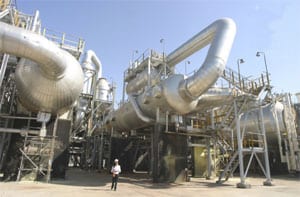|
|
|
Foreign Investment Is Slow To Arrive
Analysts say the jury is still out on whether the development agencies efforts at diversifying Kazakhstans economy will be successful. It is really too early to tell, as they have only been created in the last few years, says Sharon Raj, a director in the sovereign department at Fitch Ratings in London. Certainly economic statistics show that the non-oil sectors have been doing well recently, but critics would say that this could simply be due to the favorable international environment and the spillover of high oil prices.
Gary Litman, vice president for Europe and Eurasia at the US Chamber of Commerce in Washington, says the government has not been very successful in either attracting foreign investment into the non-oil and metals industry or in persuading locals to set up shop. Litman believes there is a lack of entrepreneurial spirit among most Kazakh citizens. Its a cultural issue, he says. They made a huge leap into the 21st century after the Soviet era, and then, with the oil affluence, they felt they were entitled to the proceeds without being entrepreneurial themselves. They have not developed an entrepreneurial class.
Litman adds that one bright spot is a government program that has been sending thousands of graduate students abroad each year for the past three to four years. The government is funding graduate education for the best and the brightest, and they are going to the best business schools, says Litman. Many return home to work in government ministries or in commerce.
Foreign organizations are also establishing initiatives aimed at promoting the country. This September, for example, the US embassy in Kazakhstan is teaming up with several US business groups to host a conference in San Diego that will focus on business opportunities in the former Soviet republic. Government ministers from Kazakhstan are to discuss opportunities in information technology, telecommunications, healthcare and other sectors.
As the government works to diversify the economy, the countrys oil sector and the increase in world oil prices is keeping its economic outlook bright. Economic growth in this giant nation, about the size of Western Europe, topped 9% last year and is expected to increase by at least 8% this year as inflation remains steady at 6.5%.
Analysts laud economic officials for adhering to a tight fiscal and monetary policy that has led to strong macroeconomic indicators and little government debt. And while the government and its people may not be pushing for much change, analysts like its stability. The political leadership is stable, says Jonathan Schiffer, senior credit officer at Moodys Investors Service in New York City.
The country also has a strong banking system that is well regulated and not fragmented, with the three largest banks accounting for nearly 70% of banking assets. Direct government involvement in the banking sector is limited. Litman says the banks are not risk-takers, and there is not much loan activity to companies without tangible assets. Foreign firms have expressed minimal interest in the banking sector, although Litman believes the government would welcome foreign investment. Kazakh banks need the know-how and capital and technology, he says.
Luchand at Standard & Poors believes the government could help encourage the development of private enterprises by getting rid of the red tape, corruption and tax problems that interfere with the businesses. If youre not a big guy, dealing with all the authorities can be difficultand even a bit dangerous for the little guy, he says.
Corruption is a big issue. Kazakhstan scored 2.2 out of a possible 10 in the 2004 Corruption Perceptions Index, which is published by Transparency International, a Berlin-based group that fights corruption worldwide. Its like Russia: There is corruption and demands for bribes at all levels, says Dick McCormack, a senior adviser at the Center for Strategic and International Studies in Washington. Theres not the same legal protections that other companies have in other places.
Yet officials at ChevronTexaco remain undeterred. The giant oil company is Kazakhstans leading oil producer and has been operating in the country since 1993 when it became a partner in the Tengizchevroil (TCO) venture. Today, ChevronTexaco has a 50% stake in TCO, which produces about 280,000 barrels of oil and 298 million cubic feet of natural gas per day. The San Ramon, California-based oil company is committed to financing half of a $4 billion expansion project of TCO. It also has a 20% equity interest in the countrys other large oil field, Karachaganak.
Weve always had an excellent relationship with the government, says company spokesperson Don Campbell. That relationship has been beneficial to Chevron and to the Kazakh people. And it is exactly the sort of relationship that the country is looking to build in other sectors.
Paula L. Green




